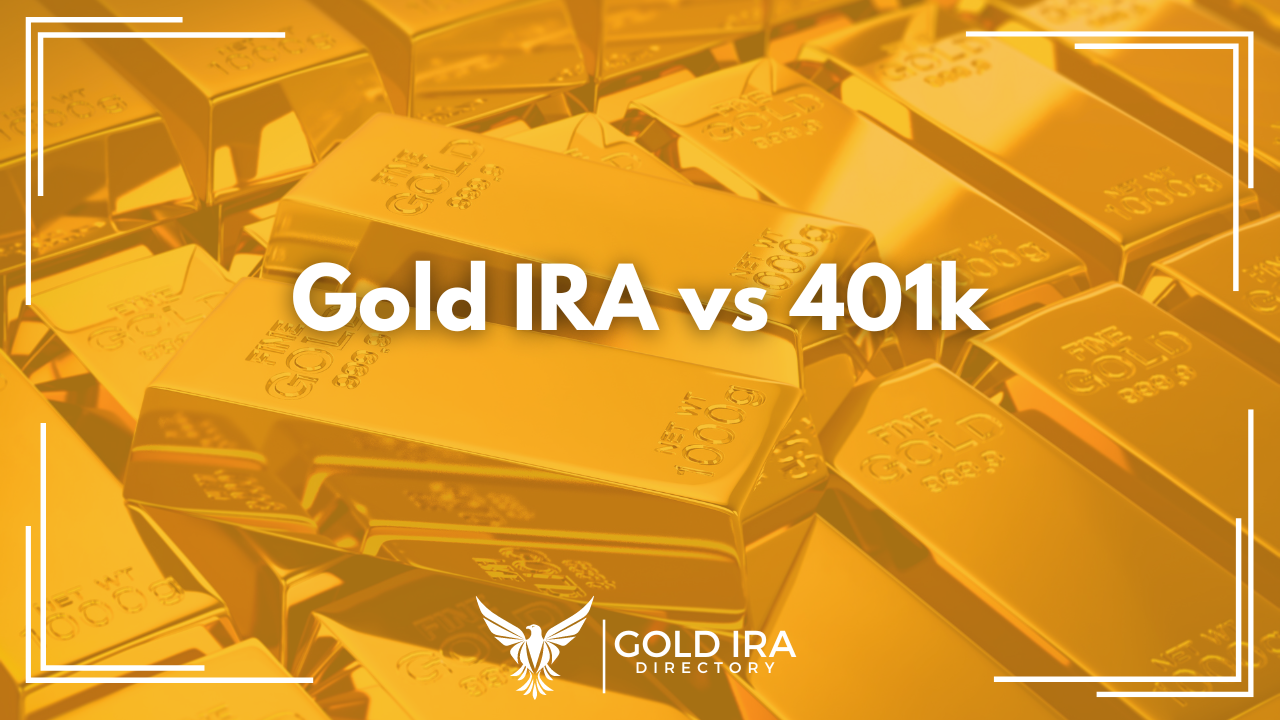
Are you caught in a dilemma between putting your money into a Gold IRA or sticking with a traditional 401k? This article aims to guide you through the decision-making process by highlighting the distinctions in selecting, relocating, and the tax advantages associated with each choice.
Find the Best Gold IRA Company of Your State
Gold IRA vs 401(k): Overview of Differences
| Feature | Gold IRA | 401(k) |
|---|---|---|
| Type of Account | Self-directed IRA specifically for gold and other precious metals | Employer-sponsored defined contribution plan |
| Investment Options | Physical gold, silver, platinum, palladium; gold-related securities | Mutual funds, stocks, bonds, etc. |
| Contribution Limits (2024) | $7,000 for under 50; $8,000 for 50 and older | $23,000 for under 50; $30,500 for 50 and older |
| Tax Treatment on Contributions | Pre-tax for Traditional; After-tax for Roth | Pre-tax for Traditional; After-tax for Roth |
| Tax Treatment on Withdrawals | Taxed on withdrawal for Traditional; Tax-free for qualified Roth withdrawals | Taxed as ordinary income for Traditional; Tax-free for qualified Roth withdrawals |
| Required Minimum Distributions (RMDs) | Yes, must start at age 73 | Yes, must start at age 73 |
| Fees | Generally higher due to storage and insurance | Varies by plan, usually low |
| Storage Requirements | Must be stored in IRS-approved facility | Not applicable |
| Employer Match | Not available | Often offered, varies by employer |
| Account Management | Self-directed | Managed by employer-selected administrator |
| Rollover Options | Can be rolled over from other IRAs or 401(k)s | Can be rolled over to another 401(k) or IRA when leaving employer |
This table provides a clear comparison between Gold IRAs and 401(k)s, highlighting their unique features and differences. It’s important to note that while both offer tax advantages for retirement savings, they have distinct characteristics in terms of investment options, contribution limits, and management structure.
When you invest in gold via a Gold IRA, it’s important to grasp the specific tax implications that come into play. A Gold IRA stands apart from traditional IRAs or 401(k)s, which typically permit investments in stocks, bonds, or mutual funds. Instead, it emphasizes investing in tangible precious metals, such as gold coins and bars. This variation in investment type requires a different strategy for taxation.

Investments in a Gold IRA grow without immediate tax implications, so you won’t incur taxes on your gains until you decide to make withdrawals. When you eventually take distributions, keep in mind that they will be taxed as ordinary income, according to your tax rate at the time you withdraw the funds. This is different from certain assets in conventional retirement accounts that might be eligible for long-term capital gains tax rates, which tend to be lower.
Furthermore, similar to a 401(k) or a traditional IRA, Required Minimum Distributions (RMDs) become obligatory at age 72, influencing your choices regarding the timing and method of liquidating portions of your investment. It’s important to keep in mind that there could be particular fees linked to the purchase, storage, and insurance of physical gold, which may affect the overall tax benefits of this investment choice.
Grasping these tax implications is essential for anyone thinking about incorporating gold into their retirement strategy, making sure that the advantages of this investment fit with their long-term financial objectives and tax planning approaches.
Investment Approaches and Considerations
When looking at investment strategies between a Gold IRA and a 401k, it’s important to remember that diversification plays a crucial role. A Gold IRA provides an opportunity to invest in precious metals, like gold coins, serving as a solid asset to protect against inflation. On the other hand, a 401k typically comprises a combination of stocks, bonds, and perhaps mutual funds or ETFs, all tied to how the market performs.
When it comes to caution, fees are something to keep in mind. Gold IRAs often have higher setup and storage fees in comparison to the administrative fees associated with a 401k. Furthermore, grasping the tax implications is essential. Both accounts offer tax benefits, but a 401k generally allows for an immediate tax deduction on contributions, with ordinary income tax payable when funds are withdrawn. On the other hand, Gold IRAs, particularly the Roth varieties, can provide tax-free growth, although they don’t come with the advantage of an immediate tax deduction.
Lastly, take a moment to think about the regulations concerning Required Minimum Distributions (RMDs). Gold IRAs and 401k plans come with required minimum distributions, which influence the timing and amount you must take out once you hit a specific age. Not following the rules can lead to significant consequences.
What is a 401(k)?
A 401(k) is an employer-sponsored retirement savings plan that offers tax advantages to both employees and employers. It’s named after the section of the Internal Revenue Code that governs it.
Types of 401(k)s
There are two main types:
1. Traditional 401(k): Contributions are made with pre-tax dollars, reducing your taxable income for the year.
2. Roth 401(k): Contributions are made with after-tax dollars, but qualified withdrawals in retirement are tax-free.
Contribution Limits
For 2024, the IRS has set the following limits:
– Employee contribution limit: $23,000
– Additional “catch-up” contribution for those 50 and older: $7,500
– Total contribution limit (employee + employer): $69,000
Tax Implications
Traditional 401(k)
– Contributions reduce your taxable income for the year.
– Earnings grow tax-deferred.
– Withdrawals in retirement are taxed as ordinary income.
Roth 401(k)
– Contributions are made with after-tax dollars.
– Earnings grow tax-free.
– Qualified withdrawals in retirement are tax-free.
Withdrawal Rules
– Generally, you can start taking penalty-free distributions at age 59½.
– Early withdrawals (before 59½) may incur a 10% penalty plus income taxes.
– Required Minimum Distributions (RMDs) must begin at age 73 for traditional 401(k)s.
Employer Contributions
Many employers offer matching contributions, which are tax-deductible for the company and tax-deferred for the employee until withdrawal.
Rollover Options
When changing jobs, you can:
1. Leave the money in your old employer’s plan
2. Roll it over to your new employer’s plan
3. Roll it over to an IRA
4. Cash it out (not recommended due to taxes and potential penalties)
Remember, 401(k)s are powerful tools for retirement savings, offering significant tax advantages. However, they also come with complex rules and potential penalties for early withdrawals. It’s always wise to consult with a tax professional or financial advisor for personalized advice.
What’s a Gold IRA?
A Gold IRA is a special type of retirement account that lets you invest in physical gold and other precious metals. It’s like a regular IRA, but instead of stocks or bonds, you’re holding actual gold.
Tax Treatment
– Traditional Gold IRA: Works like a traditional IRA. You can deduct contributions from your taxes now, but you’ll pay taxes when you take the money out in retirement.
– Roth Gold IRA: Similar to a Roth IRA. You pay taxes on the money now, but withdrawals in retirement are tax-free if you follow the rules.
Contribution Limits
– For 2024, you can put in up to $7,000 per year, or $8,000 if you’re 50 or older.
– These limits are the same as regular IRAs and count towards your total IRA contributions for the year.
Tax Advantages
– Your investments grow tax-deferred (traditional) or potentially tax-free (Roth).
– You might get a tax deduction now with a traditional Gold IRA.
Distribution Rules
– You can start taking money out without penalty at age 59½.
– If you take money out earlier, you’ll usually pay a 10% penalty plus regular income taxes.
– For traditional Gold IRAs, you must start taking required minimum distributions (RMDs) at age 73.
Special Considerations
– The IRS has strict rules about what kind of gold you can hold and where you can keep it.
– You can’t keep the gold at home – it must be in an IRS-approved storage facility.
– Taking physical possession of the gold is considered a distribution and may be taxable.
Fees
– Gold IRAs often have higher fees than regular IRAs because of storage and insurance costs.
– These fees aren’t tax-deductible if they’re paid from your IRA funds.
Remember, while Gold IRAs can help diversify your retirement savings, they come with their own set of tax rules and potential costs. It’s important to consider how this fits into your overall retirement and tax strategy. Always consult with a financial advisor or tax professional before making significant changes to your retirement plans.
Advantages and Disadvantages of a Gold IRA
A gold IRA, as previously noted, serves to diversify your investment portfolio. In times of significant market declines, gold has traditionally shown a tendency to rise while stocks fall. (In favorable periods, gold and stocks often rise together.) Gold can serve as a safeguard during significant financial market crises and also protect against inflation. Generally, when the dollar weakens, the price of gold tends to rise.
While equity investments can serve as reasonable protections against inflation, fixed-income securities such as bonds might struggle to keep up. Fixed-income investments are generally considered a secure option for retirement savings. However, if the impact of inflation on them causes you any concern, investing in gold might be the solution.
That being said, a gold IRA does have its drawbacks. As mentioned earlier, there are considerable initial expenses involved in setting up a gold IRA. Additionally, it’s important to note that gold does not provide dividends or interest, which means that keeping it in an IRA undermines some of the benefits of this tax-advantaged savings option. Additionally, gold isn’t considered a liquid asset. Once you hit retirement age and are required to take those minimum distributions, withdrawing funds can become quite complicated.
FAQs on Gold IRA vs 401(k)
Is it advisable to transfer my 401k into a gold IRA?
Moving your 401(k) into a gold IRA can be a wise decision for diversifying your retirement savings and protecting against economic instability. It’s important to take a moment to weigh the risks and expenses before arriving at a decision.
Which is more advantageous, a 401k or an IRA?
Your financial situation and goals will ultimately determine the best course of action. Typically, it’s advisable for employees to take advantage of 401(k) plans when they have access, particularly if their employer offers a matching contribution. Conversely, IRAs present a solid choice for individuals who do not have access to a retirement plan through their employer.
Is gold a better investment than a 401k?
Gold isn’t automatically superior to a 401k when it comes to retirement investing. The price of gold can fluctuate quite a bit and often lacks predictability, which can make it a rather risky option for those looking for long-term growth. Consulting with a financial advisor is crucial for developing a robust financial plan for your future.
What are the disadvantages of a gold IRA?
Some drawbacks of a gold IRA are the elevated account fees, restricted investment choices, diminished growth potential, tax penalties for early withdrawals, and the necessity for minimum distributions.
Conclusion
Certainly, there are plenty of differences between Gold IRA and 401k accounts. Both of them have their pros and cons.
It’s worth looking into the best gold IRA companies if you’re considering a gold IRA rollover.
References:


